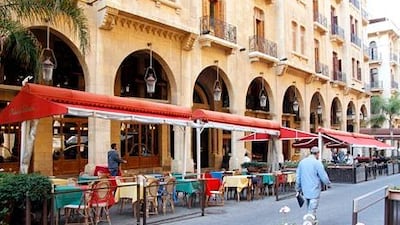There was a truth in Lebanon, almost universally acknowledged, that upmarket venues - hotels and restaurants - would be insulated from a dip in tourism activity. They would always be full. In this segment, demand simply exceeded supply.
But just to show what a terrible year it has been, we now learn that, according to a survey by Ernst & Young, Lebanon's five-star hotels averaged a measly 56 per cent occupancy in the first 10 months of 2012. Regionally, we dropped two places to 17th out of 21 countries.
No one should be particularly surprised. Indeed, a week earlier, on December 18, the state announced what amounted to a fire sale, with the tourism minister Fadi Abboud declaring a 50-day period of discounted airfares, hotel rooms and shopping discounts starting on January 8. It was all a case of far too little, much too late.
The Mayan apocalypse may not have visited us but for many businesses in Lebanon, 2012 has been a meteoric flop.
Only two years ago we were the darlings of the foreign travel press. Beirut was the mini break destination sans pareil. The city had great hotels, cool shops and tasty restaurants, all apparently patronised by high-octane bankers or edgy designer types.
But then came the Arab Spring. Syria, our big brother (in more senses than one), was rocked to its core. Not only were its people taking to the streets but the regime was on the verge of being indicted by an international court. It was a case of all hands on deck for a new pro-Syrian government in Beirut and to hell with everything else, including the economy.
Nearly two years on, we are feeling the fallout. A day before Mr Abboud announced his last throw of the tourism dice, it was reported that about 10 shops and restaurants in the Beirut Central District (BCD) would close next month. It was sad news from what was once the showpiece of postwar Lebanon.
It was never always thus. After 9/11, Arabs, who felt self-conscious about travelling to their usual American and European haunts, suddenly had Beirut and its new city centre. Who needed London or Paris when the newly rebuilt Lebanese capital offered everything they wanted and did it with that refreshing Lebanese sense of aplomb?
And for nearly half a decade, it was a happy marriage. But then, ironically on Valentine's Day 2005, Rafik Hariri, the former Lebanese prime minister and billionaire who had masterminded the gleaming new city centre, was assassinated. The square mile that had symbolised renewal and optimism would go on to define Lebanon for the next six years.
The BCD may have been the epicentre of the 2005 Cedar Revolution but it was also the scene of a 19-month opposition sit-in from November 2006 until May 2008 that strangled the local economy.
Businesses eventually moved out, either to east or west of the city. The Beirut Souks, the area's showpiece mall, did eventually open in late 2009 (there had been a 10-year delay due to political bickering), but by then the fizz had gone.
With healthy tourism and a vibrant economy the BCD may have eventually bounced back but the Syrian crisis and a major security emergency this summer that saw the Arabian Gulf Arabs stay at home, brought economic activity across the city to its knees.
But to blame the shocking figures and the upcoming closures purely on the regional politics is to ignore the government's negligence and the tunnel vision of what is an otherwise vibrant and innovative hospitality sector. Lebanon has become a one-trick pony that has gambled on the assumption that the Gulf Arabs and the expatriate Lebanese will come no matter what.
In the meantime, the region has moved on. We have to reinvent ourselves.
Michael Karam is a Beirut-based writer

